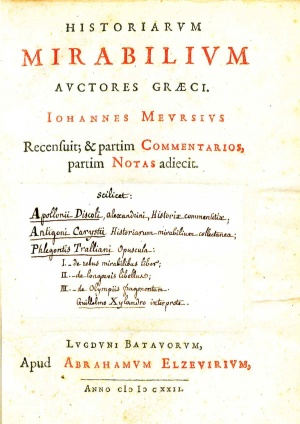Difference between revisions of "Historiarum Mirabilium Auctores Graeci"
| Line 12: | Line 12: | ||
|pages=[20], 174, [10], 210, [10], 190 | |pages=[20], 174, [10], 210, [10], 190 | ||
|desc=4to (20 cm.) | |desc=4to (20 cm.) | ||
| − | }}This 1622 | + | }}This 1622 book is a compilation of historical works of select Greek authors by the Dutch classical scholar [http://en.wikipedia.org/wiki/Johannes_Meursius Johannes Meursius]. Each work is transcribed in Greek on one page and translated into Latin on the adjacent page so both can be seen when open. The book was published in the town of Lugundi Batavorum (or Lugundum Batavorum), a Roman outpost also known as the [http://en.wikipedia.org/wiki/Brittenburg Brittenburg] in the Netherlands. This outpost “was a naval base and fortified military granary at the estuary of the river Rhine.” It was historically associated with the well-known Dutch city of [http://en.wikipedia.org/wiki/Leiden Leiden], though that is known now to be an incorrect association. The ruins of the settlement became visible on the beach in the sixteenth and seventeenth centuries, and were committed to perpetuity though drawings and maps. The only other information we have about the Roman base is from stories of [http://en.wikipedia.org/wiki/Caligula Emporor Caligula’s] biographer [http://en.wikipedia.org/wiki/Suetonius Suetonius].<ref>[http://www.livius.org/ga-gh/germania/lugdunum.html “Lugdunum (Brittenburg)”] by Jona Lendering in ''Livius Articles on Ancient History'' (accessed September 23, 2013).</ref><br/> |
| − | <br/>Meursius begins the work with a dedication or introduction which leads into the transcriptions and translations of ''Apollonii Discoli'', ''Antigoni Carystii'', and ''Phlegoritis Tralliani''. The title page notes that the works are reviewed by Meursius, some are commented on by him and some have notes added. There are several indexes throughout the book to guide readers to specific topics | + | <br/> |
| + | Meursius begins the work with a dedication or introduction, which leads into the transcriptions and translations of ''Apollonii Discoli'', ''Antigoni Carystii'', and ''Phlegoritis Tralliani''. The title page notes that the works are reviewed by Meursius, some are commented on by him and some have notes added. There are several indexes throughout the book to guide readers to specific topics. | ||
==Evidence for Inclusion in Wythe's Library== | ==Evidence for Inclusion in Wythe's Library== | ||
Revision as of 10:55, 31 March 2014
| Historiarum Mirabilium Auctores Graeci | |
|
Title page from Historiarum Mirabilium Auctores Graeci, George Wythe Collection, Wolf Law Library, College of William & Mary. | |
| Editor | Johannes Meursius |
| Published | Lugduni Batavorum: Apud Abraham Elzevirium |
| Date | 1622 |
| Language | Greek and Latin |
| Pages | [20], 174, [10], 210, [10], 190 |
| Desc. | 4to (20 cm.) |
This 1622 book is a compilation of historical works of select Greek authors by the Dutch classical scholar Johannes Meursius. Each work is transcribed in Greek on one page and translated into Latin on the adjacent page so both can be seen when open. The book was published in the town of Lugundi Batavorum (or Lugundum Batavorum), a Roman outpost also known as the Brittenburg in the Netherlands. This outpost “was a naval base and fortified military granary at the estuary of the river Rhine.” It was historically associated with the well-known Dutch city of Leiden, though that is known now to be an incorrect association. The ruins of the settlement became visible on the beach in the sixteenth and seventeenth centuries, and were committed to perpetuity though drawings and maps. The only other information we have about the Roman base is from stories of Emporor Caligula’s biographer Suetonius.[1]
Meursius begins the work with a dedication or introduction, which leads into the transcriptions and translations of Apollonii Discoli, Antigoni Carystii, and Phlegoritis Tralliani. The title page notes that the works are reviewed by Meursius, some are commented on by him and some have notes added. There are several indexes throughout the book to guide readers to specific topics.
Evidence for Inclusion in Wythe's Library
Included in the Brown Bibliography based on an exchange of letters between Wythe and Thomas Jefferson. On April 22, 1790, Wythe wrote to Jefferson, "I have not been able, after long inquiry, to obtain the writings of Phlegon mentioned by Ferguson in his tables and tracts." Jefferson replied on June 13, 1790, "The best edition of these fragments of Phlegon is that given by Meursius at Leyden in 1622. In 4to. Gr. & Lat. with notes." Jefferson reference is to Historiarum Mirabilium Auctores Graeci, compiled and edited by Johannes Meursius. According to Brown, Jefferson never owned a copy of this edition. The Wolf Law Library purchased a copy of this because Brown includes it in his bibliography and because Wythe purchased many other Greek and Latin titles.
Description of the Wolf Law Library's copy
Bound in eighteenth century crushed morocco, smooth spine, divided into six panels by gilt chain link device. Title in gilt to second panel, remaining panels with central gilt lozenge, covers with triple fillet border, gilt roll to edges and inner dentelles. The printer's device has been excised from the title page and replaced with a window-mounted manuscript detailing the contents. Purchased from Temple Rare Books.
View this book in William & Mary's online catalog.
References
- ↑ “Lugdunum (Brittenburg)” by Jona Lendering in Livius Articles on Ancient History (accessed September 23, 2013).
External Links
Read this book in Google Books.
